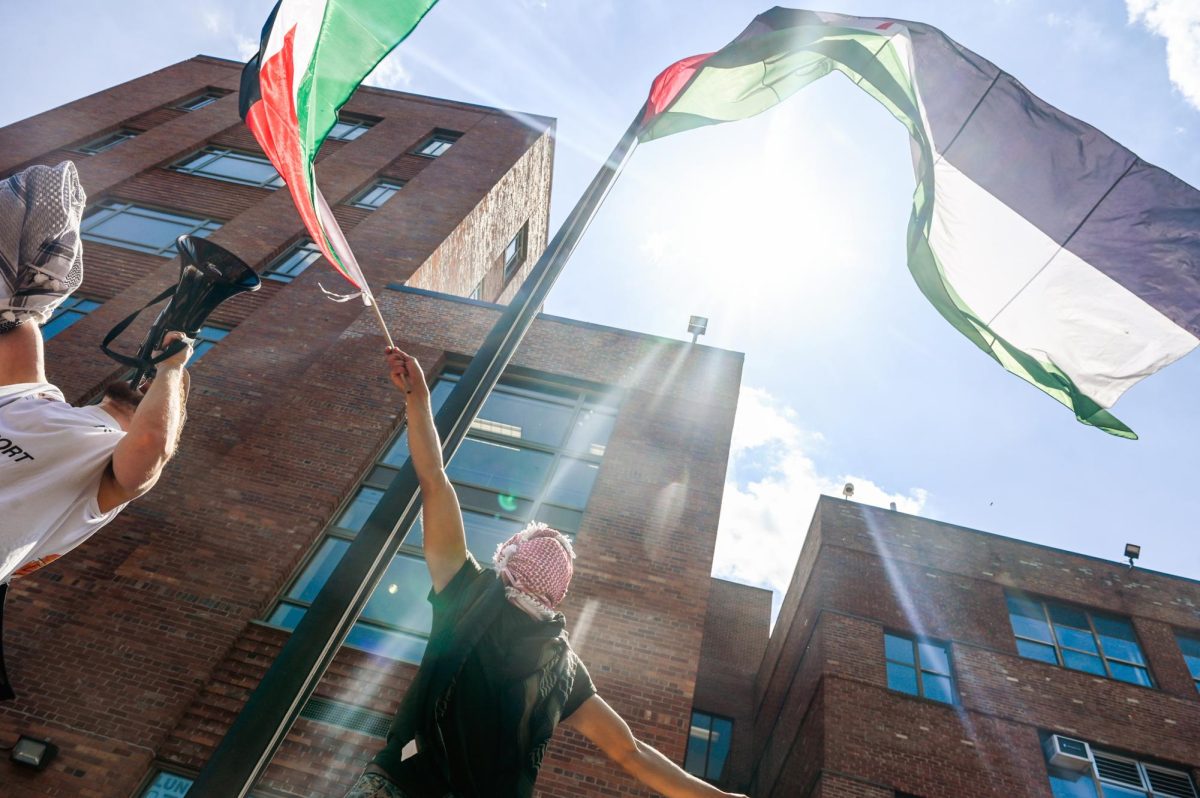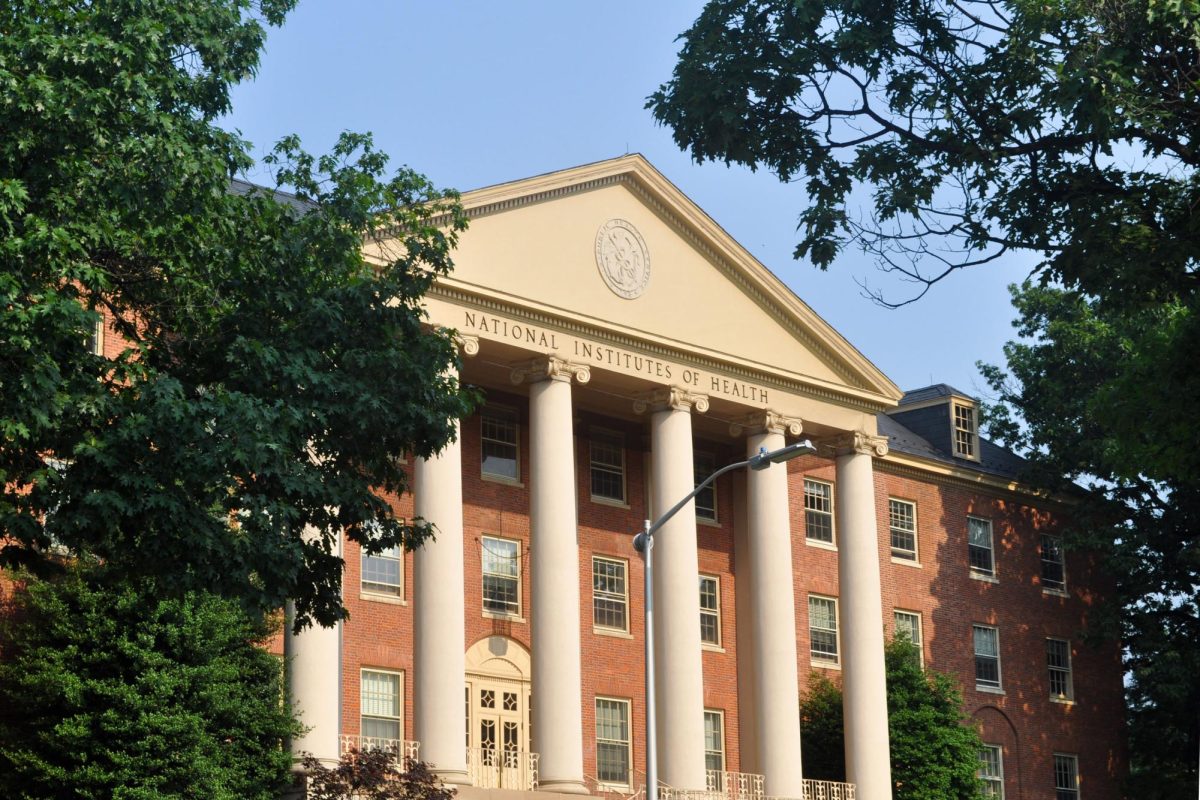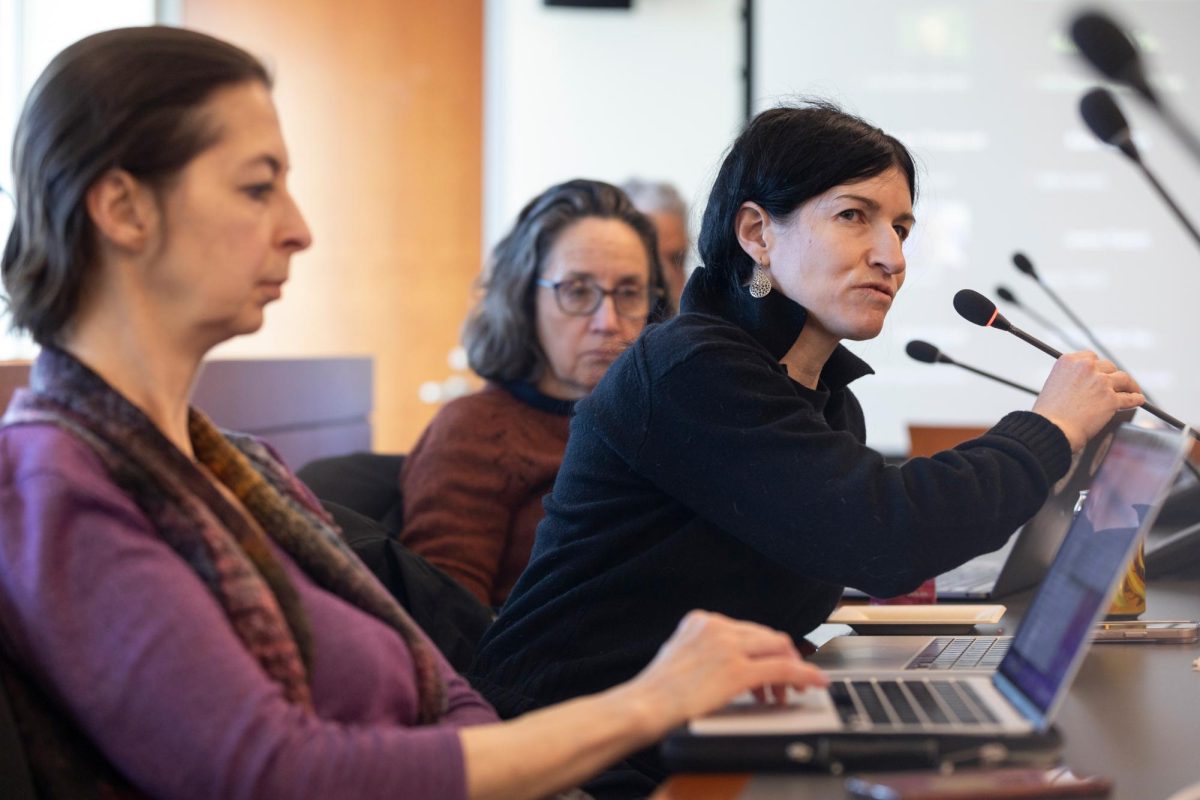Updated: Jan. 2, 2025, at 5:06 p.m.
GW attracted local and national scrutiny in 2024, a year punctuated by turbulence over campus protests against the war in Gaza and administrative decision-making.
Much alike many other universities nationwide, community members, politicians, national news outlets and activists raised questions about the University’s free speech and security policies following the pro-Palestinian encampment on campus in April where protesters demanded the University divest from companies with ties to Israel and criticized its handling of past demonstrations. The University’s medical enterprise grappled with concerns about its worsening financial losses amid leadership changes and GW Police Department officers resigned after safety violations stirred disarray within the force.
Here’s a look at the top stories at GW from 2024:
Pro-Palestinian protesters erect U-Yard encampment, igniting campus lightning rod
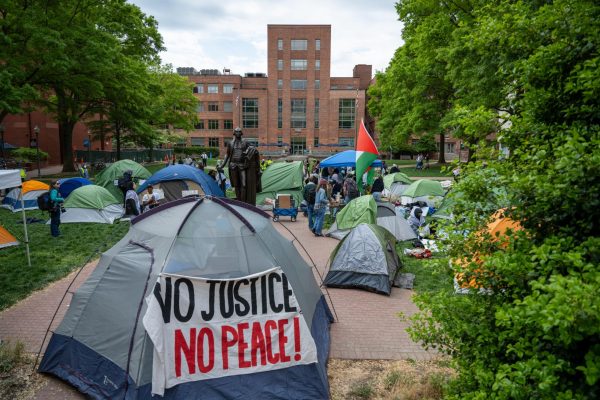
In April, hundreds of pro-Palestinian demonstrators from universities across the D.C. metropolitan area gathered in University Yard to support a nearly two week-long Gaza solidarity encampment, part of a national movement across college campuses. Leading up to the encampment, tensions had grown between pro-Palestinian student activists who had been disciplined for demonstrating against the war and officials who were attempting to mitigate growing campus polarization.
The Washington Post reported that the Metropolitan Police Department rejected the University’s plea to clear the encampment a day after it began. University President Ellen Granberg said in September that to her “knowledge,” no officials made such a request.
Officials closed community spaces like U-Yard and Kogan Plaza a day after the protest began. Demonstrators overran the U-Yard fences on H Street on the fourth day of the encampment after protesters said a GWPD officer attempted to arrest two demonstrators, a claim officials said was false.
Local and national officials visited the encampment, some condemning D.C. Mayor Muriel Bowser for refusing GW’s alleged request to clear the protest. Republican members of the House Oversight Committee met with GW officials and walked through U-Yard a week into the demonstration, prompting a new wave of nationwide criticism about the continuation of the protest after top congressional Republicans demanded Bowser answer questions about why MPD reportedly refused to clear the encampment earlier that week.
Throughout the protest, demonstrators held prayers, chanted, sang and hosted teach-ins and safety trainings. On the encampment’s eighth day, some protesters hoisted a large Palestinian flag onto the Lisner Hall flagpole and dressed the George Washington statue in U-Yard in a keffiyeh and a Palestinian flag.
D.C. police cleared the encampment in the middle of the night on May 8, pepper spraying demonstrators and arresting 33 protesters — including eight GW students — just hours before Bowser was set to testify to the House Oversight Committee. Officials cited a growing counterprotester presence as evidence of escalating violence at the encampment in emails between GW and the mayor’s office days before MPD cleared the protest.
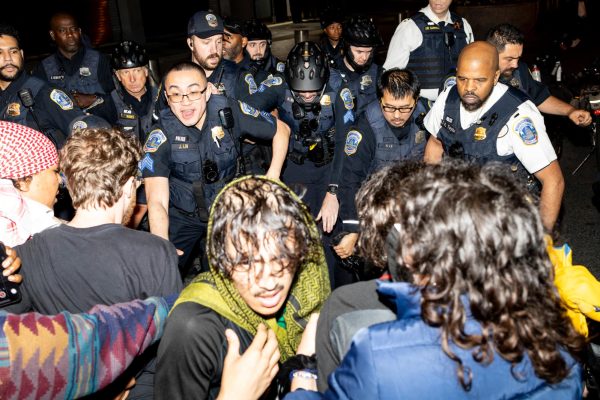
University officials repeatedly condemned the “illegal” protest and urged local officials for their “full support.” GW also hired a lobbying firm to assist with “higher education issues” two days before MPD cleared the encampment, which Granberg in September said helped the University navigate Bowser’s call to testify before the committee.
Demonstrators pitched tents outside of Granberg’s F Street house the night after MPD cleared the encampment, but voluntarily dispersed after warnings from police.
Some Jewish students said the encampment created an unsafe and antisemitic environment, citing the presence of signs at the encampment like “Students will leave when Israelis leave” and protest chants calling for an “intifada.”
More than 70 student organizations expressed their support or opposition to student protesters via social media throughout the protest. Some local leaders condemned the use of force against protesters and lack of communication to faculty while others backed the University’s response. Multiple civil rights organizations condemned the encampment clearing, pointing to reports of police’s treatment of protesters and prayer mats and Qurans that appeared to be discarded in a garbage truck after the sweep.
GW responds to campus protests, pro-Palestinian demonstrators’ demands
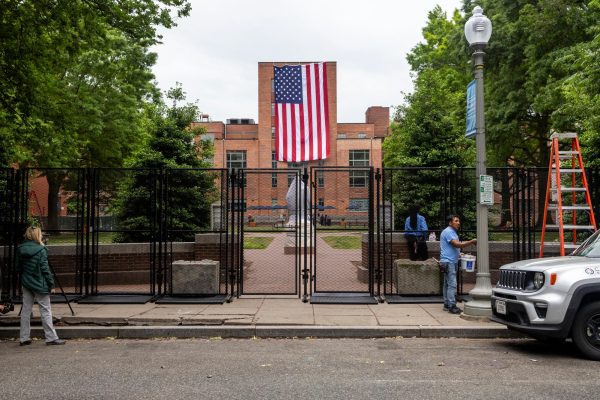
Pro-Palestinian students and graduates protested outside University Commencement on the National Mall in May. After police cleared the encampment, officials replaced the barricades around U-Yard and Kogan with temporary fences, limiting access to the spaces throughout the summer until replacing and removing the fencing, respectively.
Throughout the summer and into the fall, the University took disciplinary action against students allegedly involved in the encampment. Officials suspended the GW chapters of Students for Justice in Palestine and Jewish Voice for Peace through the fall semester and placed them along with six other student groups on disciplinary probation for varied periods, students said.
GWPD sent initial stay-away orders to students arrested at the encampment as students navigated federal and student conduct charges, but discrepancies remain regarding their access to certain University buildings and the role officials played in the process.
Officials responded to requests from students for GW to disclose its financial ties to Israel by producing a website with the University’s public financial information following the encampment and talks with student organizers just before the spring semester ended. Meetings resumed in the fall with officials from the Office of the Provost, but students “walked away” from the conversations after officials allegedly refused to engage in discussions that would result in “material outcomes.”
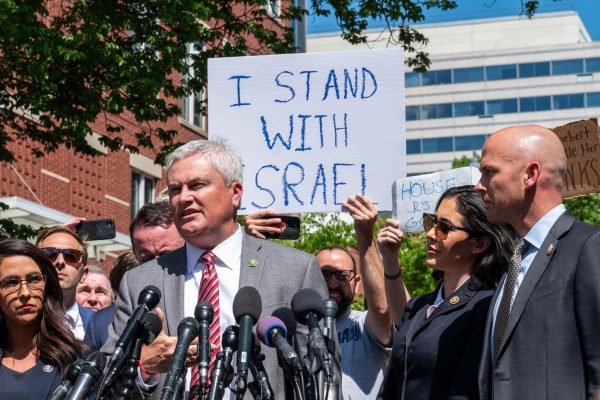
Scrutiny from congressional leadership continued into the fall as the Republican-led House Committee on Education and the Workforce accused GW of insufficiently disciplining pro-Palestinian protesters who violated GW policies in an investigation of antisemitism on college campuses. The report found officials did not charge students for 47 of the reported 73 total events of threatening behavior towards Jewish and Arab students since the outbreak of the war in Gaza.
Faculty updated their curriculum to address the ongoing war in Gaza and formed groups condemning the University’s response to protesters and urging educators to promote an inclusive environment. Campus demonstrations largely tapered off in the fall.
Division for Student Affairs officials also launched the Center for Interfaith and Spiritual Life this fall to bolster interfaith education and programming through workshops, meditation and education. Officials announced the center as part of the University’s “Strengthening Our Community in Challenging Times” plan, which officials introduced in January to review campus free speech policies and religious programming in response to the war in Gaza.
GWPD chief resigns, officials order investigation after The Hatchet’s reporting on gun safety violations, internal disarray
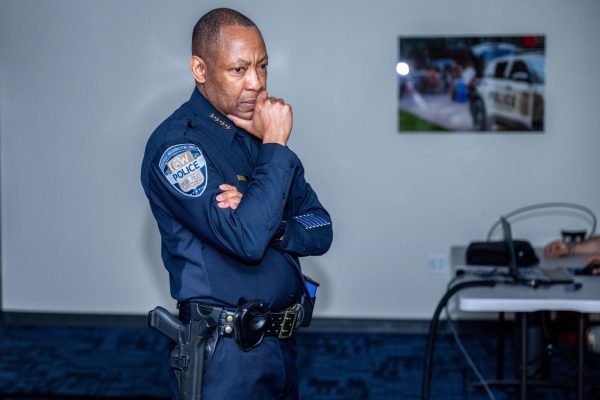
GWPD Chief James Tate resigned from his post in October following four years in the role after a Hatchet investigation the month before that detailed departmental gun safety violations and internal tumult.
Six former GWPD officers said the department’s firearm training left officers unprepared to respond to major emergencies and that internal disagreements over the arming implementation process sparked mass departures. Tate and former Captain of Operations Gabe Mullinax carried firearms unregistered in D.C. for about a month in 2023, and Tate in 2023 “routinely” stored his firearm loaded in GWPD’s armory, according to former officers and human resources reports.
Following The Hatchet’s reporting, University spokesperson Shannon McClendon said officials retained international law firm Willkie Farr & Gallagher to investigate GWPD’s arming implementation, training protocols and compliance measures, which officials anticipate will conclude early next year. McClendon said the investigation includes interviews with a “wide group” of personnel and a review of “relevant documents and other information.”
Tate’s resignation capped a string of GWPD leadership exits in 2024, with four of the department’s top six officers leaving since April. After the former officers’ reports appeared to spark Tate’s resignation, faculty leaders urged officials to reassess oversight measures intended to safeguard GWPD’s arming process.
Officials said GWPD in September completed the rollout of the Board of Trustees’ April 2023 decision to arm about 20 officers — which was met with student protests and letters in opposition from faculty — equipping about 22 officers with handguns once the department filled vacancies. But a former sergeant said at the time that only six or seven officers were currently armed because of the department turnover.
Former GW residence hall opens as D.C.’s first non-congregate unhoused shelter, wrapping up a year of delays

The Aston, a former GW residence hall on New Hampshire Avenue, opened its doors to 39 unhoused residents in November as the city’s first noncongregate shelter, a model that offers private living spaces to medically vulnerable people, mixed-gender couples, families with adult children and people waiting to move into permanent housing.
D.C. officials purchased The Aston from GW in 2023 for $27.5 million and kept the former residence hall’s roughly 100 single “studio-style” rooms with en-suite bathrooms, kitchens and air conditioning.
The Community Advisory Team — a group comprised of local governing groups, neighborhood associations and District agencies that oversee The Aston’s conversion — began meeting monthly in March.
The Aston commenced operations a year after officials initially predicted it would open in November 2023. Complications — including challenges securing a provider, two lawsuits attempting to halt the shelter’s opening, months of repairs and building code violations — plagued the shelter’s conversion and delayed its opening five times.
MFA loses over $100 million in FY 2024, brings on new leadership
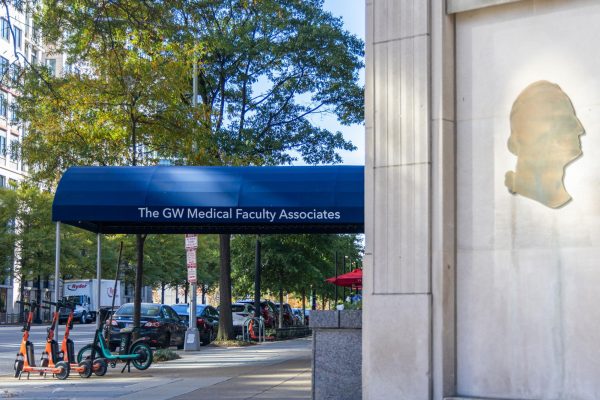
The Medical Faculty Associates, a group of physicians and faculty from GW’s medical school and GW Hospital, lost more than $107 million in Fiscal Year 2024, more than double the University’s deficit projection and its largest annual loss since GW assumed full control of the organization in December 2018.
Chief Financial Officer Bruno Fernandes said last October — four months into FY 24 — that he expected the MFA to lose between $30 and $50 million in FY2024. Fernandes delivered both of his biannual MFA financial updates in executive session to the Faculty Senate, a body that has continuously raised concerns about the enterprise’s continued losses.
Officials told MFA staffers in November that the losses were “unacceptable and unsustainable” and pledged to find “sustainable, long-term solutions” to address their impacts on patients, clinicians and staff. Granberg has repeatedly upheld that the MFA is continuing to make its debt payments to GW on time.
The MFA in May hired Bill Elliott to serve as interim CEO of the enterprise, and later appointed him as permanent CEO in October. School of Medicine and Health Sciences Dean Barbara Bass stepped away from the MFA CEO position in May.
Since GW acquired the MFA, the enterprise has accumulated a total of $272,107,000 of debt to GW and a $120 million debt to other entities. GW is held liable for decisions the MFA makes, meaning GW would have to pay the MFA’s borrowed debts if it were to file for bankruptcy.
Students, D.C. locals reckon with Trump’s 2024 election win
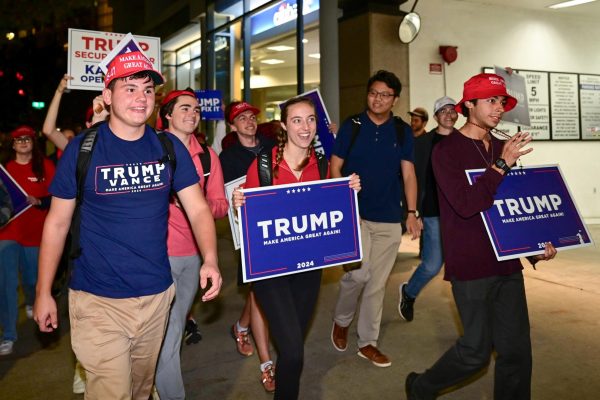
After former President Donald Trump clinched a victory in November’s presidential election, members of GW Republicans celebrated with a late-night march to the White House and then to the National Mall, with hopes that his second term will bring lower costs and tightened border policies. Students who voted for his Democratic opponent Vice President Kamala Harris expressed worries that Trump will threaten democracy, immigration, the economy and reproductive rights.
Ahead of the election, Republican students praised Trump’s pledges to curb inflation and close the southern border, though some favored challengers in the party’s primaries. Students who voted for Harris favored her promises to endorse economic policies focused on boosting the middle class and protect reproductive freedoms.
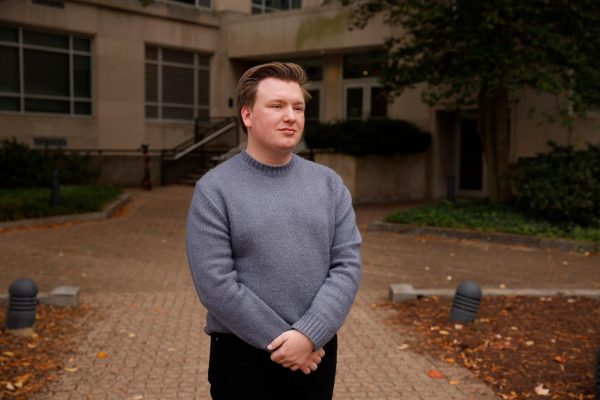
In the weeks following the election, city officials and civil rights groups said they were preparing for the possibility that Trump and the Republican congressional majority would interfere with the District’s right to self-govern. International students expressed fears about the availability of visas in the near future, citing Trump’s previous travel bans.
Officials desert plans to replace Smith Center pool with basketball facility
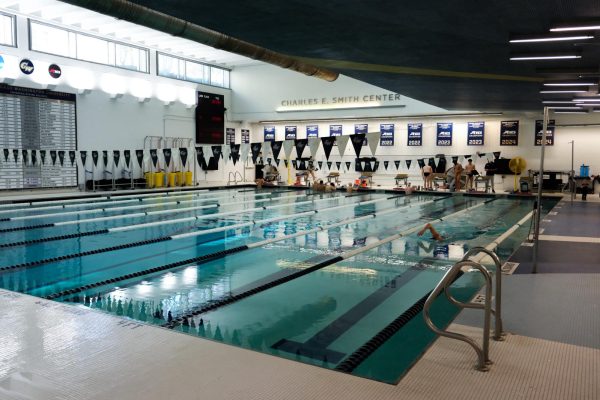
In March 2024, GW’s proposal to demolish the Smith Center swimming pool to construct an additional basketball facility for the men’s and women’s basketball teams was met with pushback from student athletes, who circulated a petition that received more than 3,500 signatures and raised concerns that swimming and diving and men’s water polo programs would lack adequate alternative practice spaces off-campus.
Officials halted the plan in April because architects and designers determined the project would be more invasive than originally predicted. Fans of GW’s basketball programs expressed disappointment at the reversal, with some saying the halt placed GW’s teams at a disadvantage compared to A-10 rivals.
This post has been updated to correct the following:
The Hatchet incorrectly reported that School of Medicine and Health Sciences Dean Barbara Bass stepped down as SMHS Dean and MFA CEO before the MFA hired Bill Elliott in May. Bass stepped away from the MFA CEO position in May and did not step down as SMHS Dean. We regret this error.


